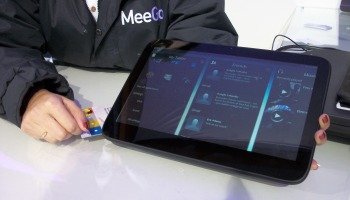

Despite Nokia’s decision to focus on Windows Phone as its primary smartphone platform, Intel showed MeeGo – the two companies’ joint open source operating system – running on a tablet, at Mobile World Congress (MWC).
Formed last year by the merger of Nokia and Intel’s Linux-based platforms Maemo and Moblin, MeeGo was going to be Nokia’s future platform, until CEO Stephen Elop realised its arrival at the end of 2011 would be too late given the company’s operating system crisis. The company is slashing development, turning MeeGo into an R-and-D sandpit, with one MeeGo phone still scheduled for delivery later this year.
At Mobile World Congress in Barcelona, Intel boss Paul Otellini said Intel is going ahead with MeeGo. The operating system had its own stand, with no Nokia presence, staffed entirely by Intel people and hopeful developers in the Meego ecosystem.
We saw a demonstration of MeeGo on a tablet, which had a clear UI, designed in the form of panels, which users can navigate by swiping sideways from one panel to the next on the home screen. Users navigate within panels by swiping up and down to scroll between websites, contacts, or messages.
This demonstration was clearly aimed at home users, designed for consuming content, and included panels for things like ‘friends’, ‘media’, ‘video’ and ‘web’. Other uses might include in-car systems, we were told, and there might also be panels for business applications “in future”.
Intel expects tablets running MeeGo to begin shipping this year, followed by several smartphones. Smartphones will likely use a different navigation system based on tabs, which Intel said is better suited to the form factor. Toshiba, Fujitsu, Asus and Acer are all currently backing the OS, as well as AMD, Texas Instruments, ST-Ericsson and Novell.
Mobile operators Wind River, Orange, Telefonica and Sprint are also all supporting the development.
From what we saw at the event, the navigation experience seems very intuitive, and the large panels were both attractive and functional. MeeGo moves away from the traditional apps-based layout, pioneered by Apple’s iPad, and instead focuses on putting all the information of the user’s home page, making is easily accessible.
Intel explains that MeeGo “puts the person using the device, and their content, at the centre of the user experience, making that experience truly personal”.
Watch a demonstration of the Meego tablet platform here:
TikTok opens e-commerce shopping in Germany, France, Italy as US future remains uncertain over divest-or-ban…
Discover expert insights on overcoming digital transformation challenges. Learn how to manage change, balance innovation,…
Microsoft drops data centre projects amounting to 2 gigawatts of power consumption as investors question…
SMIC sees revenues rise 27 percent for 2024, but profits fall nearly 50 percent amidst…
Google reassures developers Android to remain open source as it brings development entirely in-house, reduces…
NHS software services provider Advanced Computer Software Group fined £3m over ransomware breach that compromised…